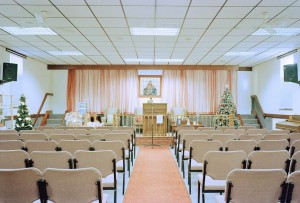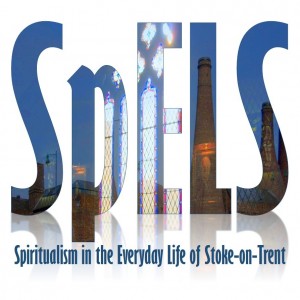Let me introduce to you my great grandmother – who was a practicing Spiritualist medium at a time when she could still have been convicted under the 1735 Witchcraft Act. Police officers would regularly attend her séances undercover, trying to prove she was up to no good. Unfortunately for them, her guides would always draw her attention to the fact that there was someone with ‘big feet’ in the room who shouldn’t be there – and she would calmly welcome ‘the police officer amongst us’ and scare the living daylights out of them!
What is Spiritualism?
The first Spiritualist church in the UK opened in 1853 in Keighley, Yorkshire, and the first national conference of Spiritualists was held in Manchester in 1890. As well as having dedicated buildings, early Spiritualist groups met in school halls, working men’s clubs and medium’s own houses – like my great grandmother’s in Cardiff in the 1930s and 40s.
Spiritualism is a philosophy and religion based on the belief that the soul continues to live following the death of the physical body and that communication with spirit is possible through the channel of trained spirit mediums. It’s often assumed that Spiritualism is a religion of the past, enjoying its heyday in the first half of the twentieth-century and since fading into the margins of cultural obscurity.
However the number of people describing themselves as ‘Spiritualist’ in the 2011 Census increased from 2001 in every part of England and Wales except for London (during the same period there was an overall decline of about 11 per cent in the number of people describing themselves as ‘Christian’). Although overall numbers of Spiritualists remain small, there’s no doubt that Spiritualism is alive and well.
Today the Spiritualists’ National Union has about 350 registered Spiritualist churches and centres throughout the UK and about 14,500 people who pay an annual subscription for membership. Not all Spiritualist centres are affiliated to the SNU and there are many hundreds of independent home ‘circles’ operating on very similar principles for the training of mediumship awareness. Beyond that are many more individuals developing their own spiritual awareness and sensitivity in much the same way, some of whom will attend churches but not all.
Beyond the dedicated physical locations they may meet and practice in, Spiritualists – by virtue of their very personal relationship with ‘Spirit’ – also inhabit invisible landscapes of otherworldly encounters which are mapped across the mundane material worlds they live in. They may encounter messages from Spirit in the form of a feather on the ground or a tingling in the hands representing the presence of a Spirit guide.
The reach of Spiritualism and its philosophy into the everyday cultural landscape of modern Britain therefore extends far beyond the bricks and mortar of church buildings.
Filling the gap…
The recent £12 million ‘Religion and Society’ research programme funded by the AHRC and ESRC (2007-2012) was created to respond to a shortfall in knowledge about what’s happening in the UK and beyond in relation to religion. The work on that programme made substantial strides in terms of documenting, understanding and theorising the role of mainstream religions in contemporary societies, from Christianity and Catholicism to Islam and Hinduism. However, there was less exploration concerning more alternative religious or spiritual practices and Spiritualism remained conspicuously silent.
Whilst still thriving Spiritualist churches represent physical identifiers in the landscape of the continued place of Spiritualism and Spirit in our cultural life, hidden beneath this are the everyday practices of the church congregations – the modern day equivalents of my great grandmother – which can reveal a richer weaving of Spirit into the fabric of everyday life.
The SpELS project, based at The Open University and funded by the AHRC, aims to uncover and shed light on this spirited landscape in the city of Stoke-on-Trent, Staffordshire. If you’re asking yourself ‘Why Stoke-on-Trent?’ you can find the answer to that question here!
SpELS is an 18 month project and you can follow us on Twitter or Facebook to find out more about why contemporary Spiritualism is about a lot more than just what mediums do in churches!
Sara MacKian



